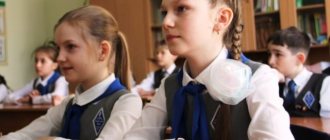Questionnaires for parents of future first-graders according to the Federal State Educational Standard
Questionnaires and tests to help parents of future first-graders
Practical advice and recommendations for parents of future first-graders
Purpose: The publication is intended for parents whose children are about to enter 1st grade. Various questionnaires and tests will help parents determine whether their child is ready for school and what else needs to be worked on in the first months of school life. Goal: to create conditions for the inclusion of parents of future first-graders in the process of preparing their child for school. Objectives: 1. Disclose to parents the demands that educational activities will make on the child’s psyche at school. 2. Involve parents in the process of analyzing possible difficulties for their children. 3. Offer parents questionnaires and tests to study tumors and changes in the child’s psyche before entering school. Preparing a child for school means, of course, buying school supplies, a school uniform, a briefcase or a backpack, but not only that. Most importantly, the child must have the desire to go to school!
This is perhaps the most important part of preparation! If you hear from your future first-grader: “I don’t want to go to school,” this means that he has the wrong motivation for entering first grade. Of course, a new briefcase, pencil case, books are very important and beautiful, but a first-grader child should be interested in the process of learning itself, the fact that school is a place where he learns a lot of interesting and new things, and learns a lot. Of course, you need to prepare your child for this not in a month or two, but much earlier - from 3-4 years old. But even if there is one month left before the start of classes, you can still improve the situation a little. It is your task to explain to your child that he is almost an adult, and at school he will learn a lot to be smart and skillful. What does this mysterious “SCHOOL READINESS” mean? Let me remind you:
it consists of three areas: physiological readiness, psychological and social.
Dear parents! Try to check for yourself whether your baby is ready to learn. To do this, give yourself answers to the questions that a psychologist may ask when entering school. 1. Conduct a simple test to determine your child’s functional readiness for school. The potential student should reach over his head with his hand to the lobe of the opposite ear. If he succeeds, the child is functionally ready for school, since the length of the body and limbs is directly related to the development of the inhibitory function of the brain. 2. Create a daily routine with your future first-grader, and together monitor its observance. Systematically accustom your child to the new regime. He must go to bed no later than nine o'clock in the evening, including on weekends. At least an hour and a half before bedtime, you should stop watching TV shows, working with the computer, and active games. Before going to bed, you should take a walk with your child in the fresh air and discuss the past day with him. To smooth out the negative emotions of early awakening, buy your child an alarm clock and play up the situation: “You are already an adult, independent. This alarm clock will be just yours, it will help you get up on time and be on time everywhere” or something like that. 3. Do not send your child to 1st grade and any section or club at the same time. The very start of school life is considered severe stress for children. 4.Each person should have their own space.
If the child does not have his own room, you need to organize his own study corner: a desk where he will do his serious business - study. This is also good from the point of view of observing hygiene rules - correct posture, allowing you to maintain posture, the necessary lighting 5. Observe your child and help him “mature” to school life, ensure that he is ready for school. Can your child: 1. Explain in words what he wants, that is, do not point with a finger, but say: jacket, candy, chicken?
2.Explain coherently, for example: “Show me...”? 3. Understand the meaning of what they read to him? 4.Speak your name clearly? 5.Remember your address and phone number? 6.Write with a pencil or crayons on paper? 7.Draw pictures for the story you have written and explain what is depicted in them? 8. Use paints, plasticine, pencils for creative self-expression? 9.Cut with blunt-tipped scissors, evenly and without getting hurt? 10.Listen and follow the instructions received? 11.Be attentive when someone talks to him? 12.Concentrate for at least 10 minutes to complete the assigned task? 13.Do you enjoy being read aloud or told stories? 14.Evaluate positively: am I a person who can do a lot? 15. “Adjust” when adults change the topic of conversation? 16. Show interest in the objects around him? 17.Do you get along with other children? Questionnaire “Is your child ready for school?”
Answer the survey questions and read the results.
Instructions: Answer the questions provided.
Answer options: “yes” or “no”. 1. Can your child do something independently for 30 minutes? 2. Can he write stories from pictures (more than 5 sentences), using adverbs, adjectives and complex sentences? 3. Does your child quickly remember poems and know several poems by heart? 4. Can he count to 10 and back? Count to 100? 5. Can he solve simple addition and subtraction problems? 6. Can your child read syllables? 7. Does he have good coordination of movements? 8. Can he draw and paint? 9. Can your child generalize—name a group of objects in one word? (dishes, cities, furniture, transport, clothing, insects)? 10. Does he want to go to school? Interpretation of results:
For each positive answer, award yourself 1 point.
Calculate your points. 1 – 3 points – Your child is not yet ready for school. 4 – 6 points – the child is conditionally ready for school, but this is not enough to successfully master the school curriculum. Do more work with him, developing all cognitive processes (memory, attention, thinking, speech, imagination), as well as fine motor skills and perseverance. 7 – 10 points – Your child is completely ready to start regular schooling.
Questionnaire “Psychosocial maturity of a future first-grader”
1. State your last name, first name, patronymic.
2. State the last name, first name and patronymic of your mother and father. 3. Are you a girl or a boy? What will you be when you grow up, a woman or a man? 4. Do you have a brother, sister? Who's older? 5. How old are you? How much will it be in a year? In two years? 6. Is it morning or evening? Day or morning? 7. When do you have breakfast - in the evening or in the morning? Do you have lunch in the morning or afternoon? What comes first - lunch or dinner? 8. Where do you live? Give your home address. 9. What does your father and mother do? 10. Do you like to draw? What color is this pencil (ribbon, dress)? 11. What season is it now - winter, spring, summer or autumn? Why do you think so? 12. When can you go sledding - in winter or summer? 13. Why does it snow in winter and not in summer? 14. What does a postman, a doctor, a teacher do? 15. Why do we need a bell or desk at school? 16. Do you want to go to school yourself? 17. Show your right eye, left ear. What are eyes and ears for? 18. At what time do the leaves fall from the trees? 19. What remains on the ground after rain? 20. What animals do you know? 21. What birds do you know? 22. Who is bigger: a cow or a goat? Bird or bee? Who has more paws: a dog or a rooster? 23. Which is greater - 8 or 5, 7 or 3? Count from 3 to 6, from 9 to 2. 24. What should you do if you accidentally break someone else’s thing? 25. Do you want to go to school? 26. What do you think will be good and interesting at school? 27. How do you think it will be better for you to study: at home with your parents, at school with a teacher, or if the teacher comes to your home? Evaluation of answers. All points are summed up in accordance with mathematical rules. 1 point - for the correct answer to all subquestions of one item (with the exception of control questions). 0.5 points - for correct but incomplete answers to the sub-questions of the item. Answers corresponding to the question posed are considered correct: Dad works as an engineer. A dog has more paws than a rooster. Answers like: Mom Tanya, dad works at work are considered incorrect. The control tasks include questions: 5, 8, 15, 24. They are scored as follows:
No. 5 - if the child can calculate how old he is - 1 point, if he names the years taking into account the months - 3 points.
No. 8 - for a complete home address with the name of the city - 2 points, incomplete - 1 point. No. 15 - for each correctly indicated use of school paraphernalia - 1 point. No. 24 - for the correct answer - 2 points. Point 16 is assessed together with points 15 and 17. If the child scored 3 points in point 15 and gave a positive answer to point 16, then the protocol notes positive motivation for studying at school (the total score must be at least 4). A result of 27-32 points - the child is considered school-aged. 23-26 points - the child is considered medium-mature. 17-22 points - low level of psychosocial maturity.
Test for parents “Is your child ready for school?”
The results of the questionnaire will allow you to determine what should be developed in your child when preparing him for school.
Place a + sign next to statements with which you agree.
Those answers that are left blank are the plan for your work with your child until September 1 and the entire first quarter. 1.Does your child want to go to school? 2. Does the fact that he learns a lot there attract him to school? 3.Can he do anything independently that requires concentration for 30 minutes, for example, assembling a construction set? 4. Is it true that your child is not shy in the presence of unfamiliar adults? 5.Can he compose a story from a picture that is no shorter than five sentences? 6.Can your child recite several poems by heart? 7.Can he change nouns according to numbers? (singular and plural) 8.Can your child read syllables or whole words? 9.Can he count to 10 and back? 10.Can your child solve simple problems involving subtraction and addition of one? 11. Is it true that your child has a “steady hand” (when using writing utensils)? 12.Does he like to draw or color pictures? 13.Can your child use scissors and glue? 14.Can he assemble a cut-out picture of 5 parts in 1 minute? 15.Does your child know the names of wild or domestic animals? 16.Can he generalize concepts, for example, call tomatoes, carrots, onions in one word “vegetables”? 17.Does your child like to do things independently - draw, assemble mosaics, etc.? 18.Can he understand and accurately follow verbal instructions? If you answered “YES”, then put 1 point, if you wrote “NO”, then put 0, then add up all the answers. The number of affirmative answers is: 15-18 points - we can assume that the child is quite ready to go to school. It was not in vain that you studied with him, and school difficulties, if they arise, will be easily overcome; 10-14 points - you are on the right track, the child has learned a lot, and the content of the questions to which you answered in the negative will tell you where to apply further efforts; 9 and less - read specialized literature, try to spend more time studying with your child and pay special attention to what he does not know how to do.
Dear parents! The results may disappoint you. But remember that we are all students in the school of life.
A child is not born a first-grader; school readiness is a set of abilities that can be exercised. If your child is preparing to become a student, you can offer him the following questionnaire. Ask the child to express his attitude to the statements contained in it, using “+” or “-” signs to record his answers. This will help you better understand the motives that guide your child when entering school. Questionnaire “I am a first grader”
1.When I go to school, I will have many friends.
2.I'm wondering what kind of lessons I will have. 3.I will invite the whole class to the birthday party. 4.I want the lesson to last longer than recess. 5.When I go to school, I will study well. 6.I’m wondering what they give for breakfast at school. 7.The best thing about school is the holidays. 8. It seems to me that school is more interesting than in the garden (at home). 9. The main thing is that they carry a backpack with books, notebooks, pens and pencils to school. 10. I want to learn everything. 11. I don’t want to go to kindergarten. 12.I want to go to school because my friends are going there too. 13.If I could (could), I would (went) to school last year. If the child agreed with points: 2,4,5,8,10,13 - the child understands what school is, has a positive attitude towards it, wants to go there, will study with interest - motivation has been formed ; 1,3,6,7,9,11 - he wants to go to school, but so far he is attracted not by studies, but by new friends and games - motivation has not been formed! .
If you are afraid for your child’s success, we advise you not to focus on developing specific skills - you should not “train” him to add and subtract, or read syllables. Teaching methods in elementary school are constantly changing, there are many proprietary programs, and your efforts may go against them, which will only complicate your child’s education in the future. Helpful tips and tricks:
1. It will be much more useful to use general developmental exercises that are useful for strengthening perception, memory, attention, and fine motor skills of the hands. 2. Teach your child to pay attention to how words sound - invite him to clearly repeat words, both Russian and foreign, familiar and unfamiliar (“electrification”, “magistracy”, etc.). 3. Learn poetry, tongue twisters and write fairy tales with him. Ask them to repeat the text they heard by heart and retell it in their own words. Remember collective games like “The lady sent a hundred rubles” - they develop voluntary action, concentration, and enrich children’s speech reserves. 4. It is very useful to remember various objects, their quantities and relative positions; Draw your child’s attention to the details of the landscape and surroundings. 5. Don’t forget to often ask him to compare different objects and phenomena - what they have in common and how they differ. 6. Invite your child to remember a sequence of numbers (for example, telephone numbers). 7. Maze games, in which you need to “trace” a character’s path, as well as a task to compare two almost identical drawings, are good for stimulating the development of concentration. 8. Do not neglect activities that develop and strengthen small hand movements: modeling, drawing, appliqué, playing with construction sets like LEGO - all this creates the prerequisites for the formation of good handwriting and contributes to the development of the child’s thinking. Use available tools - you can separate peas from corn or beans, sort buttons, arrange matches. 9. A child’s good manners are a mirror of family relationships. “Thank you,” “Excuse me,” “Can I...”, addressing an adult as “You,” should be included in the child’s speech before school. Teach your child to be polite and calm in his behavior and attitude towards people (both adults and children). 10. Do not forget that the child will continue to play for several years. Nothing wrong with that. On the contrary, the child also learns through play. It’s better to play with him and learn some concepts in the process (for example: left - right). Today, one of the most common parental mistakes is the desire to raise a child prodigy. Even before entering school, the child is taught most of the first grade curriculum and becomes uninterested in the lessons. Of course, parents want their child to study well and generally be “the very best.” However, if your child is truly a genius, he will still prove himself. Overloading a child with activities can affect his health and desire to learn. Preparing a child for school should simply consist of his general development - the processes of attention, memory, thinking, perception, speech, and motor skills. It is necessary to focus not on imparting various knowledge to the child, but on expanding his horizons and ideas about the world around him. And, no matter how your child’s objective progress progresses, try to create a healthy mood before school, in which he would strive for knowledge, not be afraid of bad grades and be confident that, whether he is an excellent student or a poor student, he is still your favorite!
Thank you for your attention!
We recommend watching:
Intellectual game for children of the preparatory group of kindergarten Summary of intellectual entertainment in the preparatory group Summary of a lesson for the preparatory school group “Getting to know the school” Summary of the parent meeting for parents of future first-graders
Similar articles:
Summary of an integrated lesson with children of senior preschool age. Journey to the land of knowledge
Math tasks in pictures for children 6-7 years old
Letter learning games for children 4-5 years old
Math problems jokes for preschoolers
Mathematical riddles for preschoolers in verse with answers
Questionnaire for parents “Let’s get to know each other” material
DEAR PARENTS!
We invite you to take part in the questionnaire survey. Your answers will help us better understand the characteristics and desires of your child - to create favorable conditions for his development.
- Child
F.I. ______________________________________________________________
Date of Birth______________________________________________________
Home address, telephone _____________________________________________________
______________________________________________________________________________________________________________________________________
- Mother
FULL NAME. ____________________________________________________________
Year of birth ______________________________________________________
Education, specialty, place of work, phone number______________________
_________________________________________________________________________________________________________________________________________________________________________________________________________
- Father
FULL NAME.____________________________________________________________
Year of birth ______________________________________________________
Education, specialty, place of work, phone number______________________
_________________________________________________________________________________________________________________________________________________________________________________________________________
- Family composition (who permanently lives with the child) ________________________________________________________________________________________________________________________________________________________________________________________________________________________________________________________________________________
- Are there other children in the family, their ages, what is the relationship with them? ________________________________________________________________________________________________________________________________________________________________________________________________________________
- Which family member is the child more attached to?
______________________________________________________________________________________________________________________________________
- How often does the child get sick? Have there been any injuries? Are there any allergies, and if so, to what?
_________________________________________________________________________________________________________________________________________________________________________________________________________
- Main types of games and activities at home
____________________________________________________________________________________________________________________________________________________________________________________________________________________________________________________
- What toys does he like, who cleans them up? ________________________________________________________________________________________________________________________________________________________________________________________________
- Is he willing to make contacts and communicate (underline as appropriate):
with children of the same age (yes, no); with older children (yes, no);
with unfamiliar adults (yes, no); with family (yes, no)
- How do you consider your child to be (underline):
calm, unemotional, very emotional
- What can a child do independently? ________________________________________________________________________________________________________________________________________________________________________________________________________________________________________________________________________________
- Which routine tasks give you more difficulty at home (underline as appropriate):
getting up, washing, feeding, going to bed, other (add) __________________________________________________________________________________________________________________________________________________________________________________________________________________________
- What is your child’s appetite (underline as appropriate):
good; eats everything; bad and little; depending on what's on the plate
How do you feed him at home (underline as appropriate):
eats himself; first himself, then we feed him; We spoon feed more often; eats carefully; not very neat; we make sure that we eat everything that is given; we allow not to eat what we don’t want; let him eat as much as he wants; the plate must be clean.
- How does a child fall asleep at home (underline as appropriate):
Fast; slowly; one of the adults is sitting next to him; sometimes urinates at night in his sleep; undresses himself before going to bed; dresses himself after sleep; he is undressed and dressed by adults.
THANK YOU FOR YOUR FRANKNESS!




